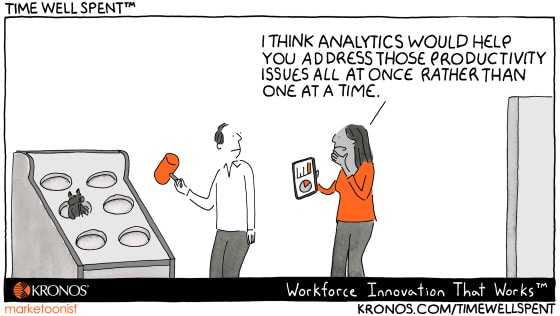
(Editor’s Note: Today’s post is brought to you by our friends at Kronos, a leading provider of workforce management and human capital management cloud solutions. Want to create an inspired workforce? Check out this Forbes interview with Kronos CEO Aron Ain where he talks about being an un-leader. Enjoy the article!)
There’s quite a bit of research that says multi-tasking isn’t good for us. And that we don’t really do it well. Even when we think that we do. But what does that mean in a world where we’re constantly being asked to manage multiple things…at the same time.
I don’t know about you, but somedays I feel like this Time Well Spent from our friends at Kronos. I feel like I’m playing Whack-A-Mole. And that’s not good. Over the years, I’ve figured out a few things that help me manage multiple things without feeling like I’m sacrificing quality – for both the project I’m working on AND my personal sanity.
Learn how to plan. I’m not talking about how to put appointments in your planner, although that can be helpful. I’m referring to finding time to think. Finding time to analyze information. Not just quickly glance at it and hastily make a decision. Having (the right) time to think, explore, develop crazy ideas and vet them can be immensely valuable.
Prioritize and reprioritize. New priorities are always popping up. The answer isn’t to simply add another priority. That’s a recipe for spreading ourselves way too thin. Whether you’re an organization or an individual, we need to decide if a new initiative is really a priority and where it falls on the list. Maybe it’s not priority number one. OR maybe it is, and we need to shift some other priorities.
Renegotiate commitments. I don’t want to say, “Don’t overcommit.” I think the better approach is, when faced with changing priorities, renegotiate your other commitments. Again, whether you’re an individual or an organization, go to the people you’ve promised a deliverable and discuss a new timetable. You’d be surprised how many people will be willing to work with you.
I don’t know that it’s realistic to think we’re never going to be asked to work on multiple projects or strategies at the same time. But that doesn’t mean we can’t reprioritize our commitments, so we can do our work well.
14






